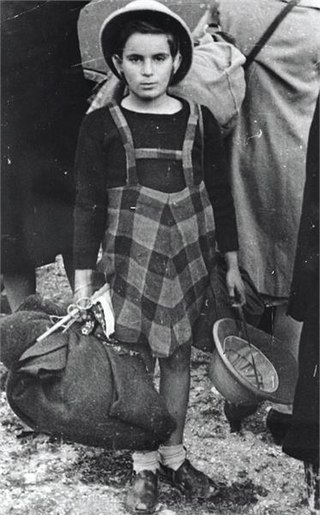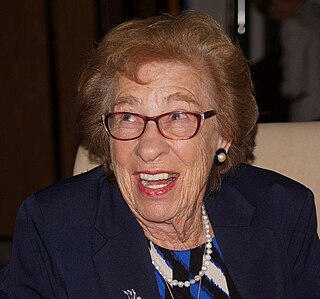
The Kindertransport was an organised rescue effort of children from Nazi-controlled territory that took place during the nine months prior to the outbreak of the Second World War. The United Kingdom took in nearly 10,000 predominantly Jewish children from Germany, Austria, Czechoslovakia, Poland, and the Free City of Danzig. The children were placed in British foster homes, hostels, schools, and farms. Often they were the only members of their families who survived the Holocaust. The programme was supported, publicised, and encouraged by the British government. Importantly the British government waived the visa immigration requirements that were not within the ability of the British Jewish community to fulfil. The British government put no number limit on the programme – it was the start of the Second World War that brought it to an end, at which time about 10,000 kindertransport children had been brought to the United Kingdom.

Youth Aliyah is a Jewish organization that rescued thousands of Jewish children from the Nazis during the Third Reich. Youth Aliyah arranged for their resettlement in Palestine in kibbutzim and youth villages that became both home and school.
The Holocaust has been a prominent subject of art and literature throughout the second half of the twentieth century. There are a wide range of ways–including dance, film, literature, music, and television–in which the Holocaust has been represented in the arts and popular culture.

Holocaust survivors are people who survived the Holocaust, defined as the persecution and attempted annihilation of the Jews by Nazi Germany and its allies before and during World War II in Europe and North Africa. There is no universally accepted definition of the term, and it has been applied variously to Jews who survived the war in German-occupied Europe or other Axis territories, as well as to those who fled to Allied and neutral countries before or during the war. In some cases, non-Jews who also experienced collective persecution under the Nazi regime are also considered Holocaust survivors. The definition has evolved over time.
Helen Rae Bamber OBE, néeHelen Balmuth, was a British psychotherapist and human rights activist. She worked with Holocaust survivors in Germany after the concentration camps were liberated in 1945. In 1947, she returned to Britain and continued her work, helping to establish Amnesty International and later co-founding the Medical Foundation for the Care of Victims of Torture. In 2005, she created the Helen Bamber Foundation to help survivors of human rights violations.
The One Thousand Children (OTC) is a designation, created in 2000, which is used to refer to the approximately 1,400 Jewish children who were rescued from Nazi Germany and other Nazi-occupied or threatened European countries, and who were taken directly to the United States during the period 1934–1945. The phrase "One Thousand Children" only refers to those children who came unaccompanied and left their parents behind back in Europe. In nearly all cases, their parents were not able to escape with their children, because they could not get the necessary visas among other reasons. Later, nearly all these parents were murdered by the Nazis.

Menachem Z. Rosensaft an attorney in New York and the founding chairman of the International Network of Children of Jewish Holocaust Survivors, is a leader of the Second Generation movement of children of Holocaust survivors. He has been described on the front page of The New York Times as one of the most prominent of the survivors' sons and daughters. He has served as national president of the Labor Zionist Alliance, and was active in the early stages of the Israeli-Palestinian peace process. As psychologist Eva Fogelman has written: "Menachem Rosensaft's moral voice has gone beyond the responsibility he felt as a child of survivors to remember and educate. He felt the need to promote peace and a tolerant State of Israel as well. He wanted to bring to justice Nazi war criminals, to fight racism and bigotry, and to work toward the continuity of the Jewish people".
Joanna Beata Michlic is a Polish social and cultural historian specializing in Polish-Jewish history and the Holocaust in Poland. An honorary senior research associate at the Centre for Collective Violence, Holocaust and Genocide Studies at University College London (UCL), she focuses in particular on the collective memory of traumatic events, particularly as it relates to gender and childhood.
Isaac Zelig Zieman was a survivor of both the Holocaust and Stalin's gulag who went on to devote his life to helping people as a psychoanalyst and an advocate for peace between Germans and Jews, Israelis and Palestinians, and other groups with a history of antagonism.
Historical trauma (HT), as used by psychotherapists social workers, historians, and psychologists, refers to the cumulative emotional harm of an individual or generation caused by a traumatic experience or event. Historical Trauma Response (HTR) refers to the manifestation of emotions and actions that stem from this perceived trauma.

Eva Schloss is an Austrian-English Holocaust survivor, memoirist and stepdaughter of Otto Frank, the father of Margot and diarist Anne Frank. Schloss speaks widely of her family's experiences during the Holocaust and is a participant in the USC Shoah Foundation's Visual History Archive project to record video answers to be used in educational tools.
Janet Liebman Jacobs is an American sociologist specializing in gender and religion. Jacobs' research focuses on women, religion, ethnicity, genocide and the social psychology of gender. She has authored seven books, including Hidden Heritage: The Legacy of the Crypto-Jews, for which she won the Distinguished Book Award from the Society for the Scientific Study of Religion, Memorializing the Holocaust: Gender, Genocide and Collective Memory, and The Holocaust Across Generations: Trauma and its Inheritance Among Descendants of Survivors, for which she won the 2017 Outstanding Book Award from the American Sociological Association.

Judith Ida Kestenberg was a child psychiatrist who worked with Holocaust survivors. She founded the International Study of Organized Persecution of Children (ISOPC) an organization that coordinated the psychologically informed interviews of over 1500 child survivors throughout much of the world. She was also the lead creator of the Kestenberg Movement Profile (KMP), used to create a psychological profile based exclusively on movement patterns.
Joseph S. Kutrzeba was a Polish-American theater producer and director.
Hadassa Bimko Rosensaft was a Polish holocaust survivor. She is credited with saving thousands of Holocaust victims.
"Like sheep to the slaughter" is a phrase which refers to the idea that Jews went passively to their deaths during the Holocaust. It derives from a similar phrase in the Hebrew Bible which positively depicts martyrdom in both the Jewish and Christian religious traditions. Opposition to the phrase became associated with Jewish nationalism due to its use in Josippon and by Jewish self-defense groups after the 1903 Kishinev pogrom. During the Holocaust, Abba Kovner and other Jewish resistance leaders used the phrase to exhort Jews to fight back. In postwar Israel, some demonized Holocaust survivors as having gone "like sheep to the slaughter" while armed resistance was glorified. The phrase was taken to mean that Jews had not tried to save their own lives, and consequently were partly responsible for their own suffering and death. This myth, which has become less prominent over time, is frequently criticized by historians, theologians, and survivors as a form of victim blaming.
Anna Ornstein is a Hungarian-American Auschwitz survivor, psychoanalyst and psychiatrist, author, speaker, and scholar.
Edith Eva Eger is a Slovakian-born American psychologist. Born to Hungarian Jewish parents, she is a Holocaust survivor and a specialist in the treatment of post-traumatic stress disorder. Her memoirs entitled The Choice - Embrace the Possible, published in 2017, became an international bestseller. Her second book, titled The Gift - 12 Lessons to Save Your Life was published in September 2020.





